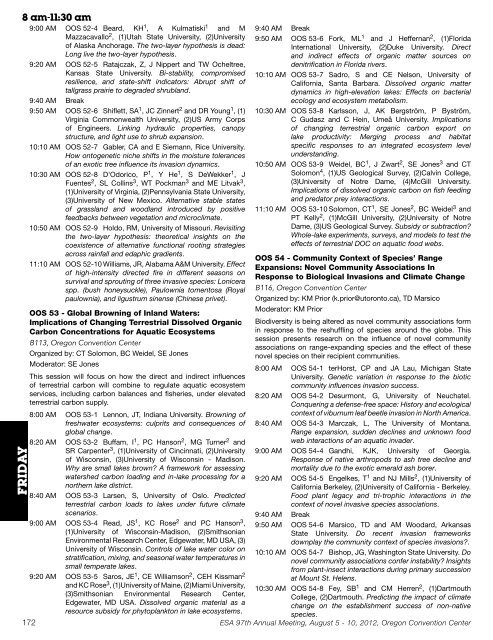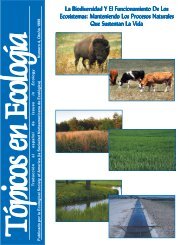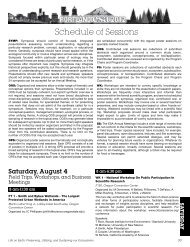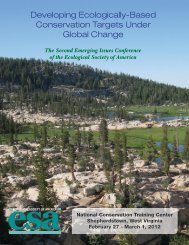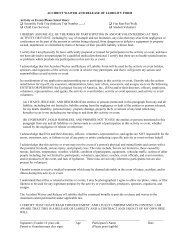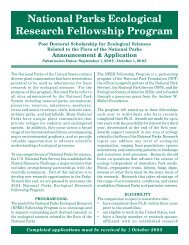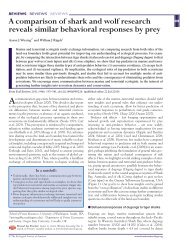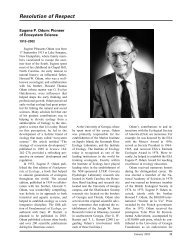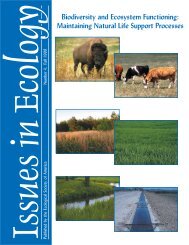Printed Program (PDF) - Ecological Society of America
Printed Program (PDF) - Ecological Society of America
Printed Program (PDF) - Ecological Society of America
Create successful ePaper yourself
Turn your PDF publications into a flip-book with our unique Google optimized e-Paper software.
8 am-11:30 am<br />
9:00 AM OOS 52-4 Beard, KH 1 , A Kulmatiski 1 and M<br />
Mazzacavallo 2 , (1)Utah State University, (2)University<br />
<strong>of</strong> Alaska Anchorage. The two-layer hypothesis is dead:<br />
Long live the two-layer hypothesis.<br />
9:20 AM OOS 52-5 Ratajczak, Z, J Nippert and TW Ocheltree,<br />
Kansas State University. Bi-stability, compromised<br />
resilience, and state-shift indicators: Abrupt shift <strong>of</strong><br />
tallgrass prairie to degraded shrubland.<br />
9:40 AM Break<br />
9:50 AM OOS 52-6 Shiflett, SA 1 , JC Zinnert 2 and DR Young 1 , (1)<br />
Virginia Commonwealth University, (2)US Army Corps<br />
<strong>of</strong> Engineers. Linking hydraulic properties, canopy<br />
structure, and light use to shrub expansion.<br />
10:10 AM OOS 52-7 Gabler, CA and E Siemann, Rice University.<br />
How ontogenetic niche shifts in the moisture tolerances<br />
<strong>of</strong> an exotic tree influence its invasion dynamics.<br />
10:30 AM OOS 52-8 D’Odorico, P 1 , Y He 1 , S DeWekker 1 , J<br />
Fuentes 2 , SL Collins 3 , WT Pockman 3 and ME Litvak 3 ,<br />
(1)University <strong>of</strong> Virginia, (2)Pennsylvania State University,<br />
(3)University <strong>of</strong> New Mexico. Alternative stable states<br />
<strong>of</strong> grassland and woodland introduced by positive<br />
feedbacks between vegetation and microclimate.<br />
10:50 AM OOS 52-9 Holdo, RM, University <strong>of</strong> Missouri. Revisiting<br />
the two-layer hypothesis: theoretical insights on the<br />
coexistence <strong>of</strong> alternative functional rooting strategies<br />
across rainfall and edaphic gradients.<br />
11:10 AM OOS 52-10 Williams, JR, Alabama A&M University. Effect<br />
<strong>of</strong> high-intensity directed fire in different seasons on<br />
survival and sprouting <strong>of</strong> three invasive species: Lonicera<br />
spp. (bush honeysuckle), Paulownia tomentosa (Royal<br />
paulownia), and ligustrum sinense (Chinese privet).<br />
9:40 AM Break<br />
9:50 AM OOS 53-6 Fork, ML 1 and J Heffernan 2 , (1)Florida<br />
International University, (2)Duke University. Direct<br />
and indirect effects <strong>of</strong> organic matter sources on<br />
denitrification in Florida rivers.<br />
10:10 AM OOS 53-7 Sadro, S and CE Nelson, University <strong>of</strong><br />
California, Santa Barbara. Dissolved organic matter<br />
dynamics in high-elevation lakes: Effects on bacterial<br />
ecology and ecosystem metabolism.<br />
10:30 AM OOS 53-8 Karlsson, J, AK Bergström, P Byström,<br />
C Gudasz and C Hein, Umeå University. Implications<br />
<strong>of</strong> changing terrestrial organic carbon export on<br />
lake productivity: Merging process and habitat<br />
specific responses to an integrated ecosystem level<br />
understanding.<br />
10:50 AM OOS 53-9 Weidel, BC 1 , J Zwart 2 , SE Jones 3 and CT<br />
Solomon 4 , (1)US Geological Survey, (2)Calvin College,<br />
(3)University <strong>of</strong> Notre Dame, (4)McGill University.<br />
Implications <strong>of</strong> dissolved organic carbon on fish feeding<br />
and predator prey interactions.<br />
11:10 AM OOS 53-10 Solomon, CT 1 , SE Jones 2 , BC Weidel 3 and<br />
PT Kelly 2 , (1)McGill University, (2)University <strong>of</strong> Notre<br />
Dame, (3)US Geological Survey. Subsidy or subtraction?<br />
Whole-lake experiments, surveys, and models to test the<br />
effects <strong>of</strong> terrestrial DOC on aquatic food webs.<br />
OOS 53 - Global Browning <strong>of</strong> Inland Waters:<br />
Implications <strong>of</strong> Changing Terrestrial Dissolved Organic<br />
Carbon Concentrations for Aquatic Ecosystems<br />
B113, Oregon Convention Center<br />
Organized by: CT Solomon, BC Weidel, SE Jones<br />
Moderator: SE Jones<br />
This session will focus on how the direct and indirect influences<br />
<strong>of</strong> terrestrial carbon will combine to regulate aquatic ecosystem<br />
services, including carbon balances and fisheries, under elevated<br />
terrestrial carbon supply.<br />
8:00 AM OOS 53-1 Lennon, JT, Indiana University. Browning <strong>of</strong><br />
freshwater ecosystems: culprits and consequences <strong>of</strong><br />
global change.<br />
8:20 AM OOS 53-2 Buffam, I<br />
172 ESA 97th Annual Meeting, August 5 - 10, 2012, Oregon Convention Center<br />
1 , PC Hanson2 , MG Turner2 and<br />
SR Carpenter3 , (1)University <strong>of</strong> Cincinnati, (2)University<br />
<strong>of</strong> Wisconsin, (3)University <strong>of</strong> Wisconsin - Madison.<br />
Why are small lakes brown? A framework for assessing<br />
watershed carbon loading and in-lake processing for a<br />
northern lake district.<br />
8:40 AM OOS 53-3 Larsen, S, University <strong>of</strong> Oslo. Predicted<br />
terrestrial carbon loads to lakes under future climate<br />
scenarios.<br />
9:00 AM OOS 53-4 Read, JS1 , KC Rose2 and PC Hanson3 9:20 AM<br />
,<br />
(1)University <strong>of</strong> Wisconsin-Madison, (2)Smithsonian<br />
Environmental Research Center, Edgewater, MD USA, (3)<br />
University <strong>of</strong> Wisconsin. Controls <strong>of</strong> lake water color on<br />
stratification, mixing, and seasonal water temperatures in<br />
small temperate lakes.<br />
OOS 53-5 Saros, JE1 , CE Williamson2 , CEH Kissman2 and KC Rose3 OOS 54 - Community Context <strong>of</strong> Species’ Range<br />
Expansions: Novel Community Associations In<br />
Response to Biological Invasions and Climate Change<br />
B116, Oregon Convention Center<br />
Organized by: KM Prior (k.prior@utoronto.ca), TD Marsico<br />
Moderator: KM Prior<br />
Biodiversity is being altered as novel community associations form<br />
in response to the reshuffling <strong>of</strong> species around the globe. This<br />
session presents research on the influence <strong>of</strong> novel community<br />
associations on range-expanding species and the effect <strong>of</strong> these<br />
novel species on their recipient communities.<br />
8:00 AM OOS 54-1 terHorst, CP and JA Lau, Michigan State<br />
University. Genetic variation in response to the biotic<br />
community influences invasion success.<br />
8:20 AM OOS 54-2 Desurmont, G, University <strong>of</strong> Neuchatel.<br />
Conquering a defense-free space: History and ecological<br />
context <strong>of</strong> viburnum leaf beetle invasion in North <strong>America</strong>.<br />
8:40 AM OOS 54-3 Marczak, L, The University <strong>of</strong> Montana.<br />
Range expansion, sudden declines and unknown food<br />
web interactions <strong>of</strong> an aquatic invader.<br />
9:00 AM OOS 54-4 Gandhi, KJK, University <strong>of</strong> Georgia.<br />
Response <strong>of</strong> native arthropods to ash tree decline and<br />
mortality due to the exotic emerald ash borer.<br />
9:20 AM OOS 54-5 Engelkes, T<br />
, (1)University <strong>of</strong> Maine, (2)Miami University,<br />
(3)Smithsonian Environmental Research Center,<br />
Edgewater, MD USA. Dissolved organic material as a<br />
resource subsidy for phytoplankton in lake ecosystems.<br />
1 and NJ Mills2 , (1)University <strong>of</strong><br />
California Berkeley, (2)University <strong>of</strong> California - Berkeley.<br />
Food plant legacy and tri-trophic interactions in the<br />
context <strong>of</strong> novel invasive species associations.<br />
9:40 AM Break<br />
9:50 AM OOS 54-6 Marsico, TD and AM Woodard, Arkansas<br />
State University. Do recent invasion frameworks<br />
downplay the community context <strong>of</strong> species invasions?.<br />
10:10 AM OOS 54-7 Bishop, JG, Washington State University. Do<br />
novel community associations confer instability? Insights<br />
from plant-insect interactions during primary succession<br />
at Mount St. Helens.<br />
10:30 AM OOS 54-8 Fey, SB1 and CM Herren2 , (1)Dartmouth<br />
College, (2)Dartmouth. Predicting the impact <strong>of</strong> climate<br />
change on the establishment success <strong>of</strong> non-native<br />
species.<br />
FRIDAY


